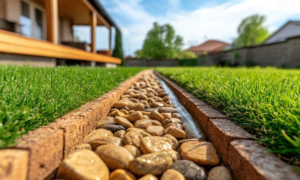Understanding hydrology is vital for homeowners. Whether you deal with water conservation, maintenance of pathways for rainwater, or managing drainage systems, knowing the key principles of hydrology can make your home safer and more efficient. In this post, we’ll explore important hydrology facts that can help you manage water around your property effectively.
1. The Basics of Hydrology Explained
Hydrology is the science of how water moves and interacts with the Earth—whether it’s rainwater, groundwater, or surface runoff. For homeowners in Duluth, Georgia, understanding these fundamentals is critical, especially with the heavy rains common to our area. Knowing how water flows on your property can help you identify risks like pooling water, erosion, or basement flooding.
For instance, if your yard holds standing water after a storm, it could signal a need for improved drainage solutions or adjustments to your landscaping. By understanding natural water flow and using the contours of your property, you can implement effective strategies to protect your home from damage.
2. Why Water Drainage Matters
Poor water drainage is one of the most significant threats to homes in areas like Gwinnett County, where sudden storms are frequent. When rainwater doesn’t drain properly, it can collect around your foundation, erode soil, and lead to costly repairs. Even slight slopes in your yard can make a difference in directing water away from your home.
For Duluth homeowners, solutions like French drains, downspouts, or swales can be game-changers for managing runoff. Proactively addressing drainage issues today ensures you avoid structural damage tomorrow. This isn’t just about aesthetics—it’s about protecting your investment and creating a safe environment for your family.
3. Understanding the Water Cycle at Home
The water cycle—evaporation, condensation, precipitation, and collection—impacts every property in Metro Atlanta. Your yard doesn’t just collect water during storms; it also filters it back into the groundwater system. Homeowners can play a part in this natural process by using sustainable practices like installing rain barrels to collect runoff. This water can be reused for irrigation, reducing both erosion and your water bill.
Additionally, planting vegetation in your yard helps manage the water cycle. Trees and shrubs native to Georgia thrive in our local climate, naturally filtering and absorbing rainwater. By incorporating these plants, you can create a beautiful, eco-friendly landscape that improves drainage and reduces runoff.
4. The Impact of Soil Type on Water Retention
Soil composition in Duluth and surrounding areas can greatly influence how water drains or pools on your property. For example:
- Clay soils, common in Georgia, retain water but can become compacted, causing drainage problems.
- Sandy soils drain quickly but struggle to hold moisture, which affects plant growth.
By conducting a soil test, Duluth homeowners can better understand their yard’s needs. This knowledge allows you to select the right landscaping solutions, improve water retention, and prevent erosion. Whether you’re planting a garden or installing drainage systems, understanding your soil is key to managing water effectively.
5. The Role of Plants in Water Management
Native plants, like sweetbay magnolia or Georgia aster, are perfect for local homeowners. Their deep root systems aerate soil, improve water infiltration, and help retain moisture during hot Georgia summers. Installing rain gardens with native plants can absorb excess water during storms, preventing runoff and soil erosion.
For homes in Duluth neighborhoods, adding vegetation not only boosts curb appeal but also helps protect your property from water-related issues. Plus, trees and shrubs reduce evaporation in the surrounding soil, creating a more resilient and sustainable landscape.
6. Common Hydrology Myths Debunked
Many homeowners believe that water always flows downhill or that leveling a yard will solve pooling issues. In reality, water flow can be influenced by compacted soils, improper grading, or blocked pathways—problems often seen in older neighborhoods in Duluth.
Another misconception is that water scarcity only happens during droughts. In truth, poor water management (like excessive runoff or inadequate storage) contributes to issues even when rainfall is plentiful. By understanding these realities, homeowners can adopt practices like rainwater collection and permeable paving to manage water year-round.
7. Best Practices for Homeowner Water Management
Implementing effective water management on your property can make a significant difference:
- Install rain barrels: Capture stormwater runoff for reuse, reducing runoff and conserving water.
- Maintain drainage systems: Regularly clean gutters, downspouts, and French drains to prevent blockages and overflow.
- Use permeable surfaces: Replace solid concrete driveways or patios with permeable pavers that allow rainwater to seep through.
By incorporating these strategies, Duluth homeowners can transform their properties into functional, sustainable spaces that manage water effectively. Proactive water management today can save you time, money, and stress down the road.
Take Control of Your Property’s Water Management
For homeowners in Duluth, Atlanta, and surrounding areas, understanding hydrology is a powerful tool to protect your property and create a sustainable environment. Whether you’re dealing with erosion, stormwater runoff, or drainage issues, implementing these principles can make your home safer and more efficient.
AQA Engineering specializes in hydrology solutions tailored for Georgia homeowners. From drainage studies to site plans, we help you manage water effectively while keeping your property compliant with local regulations.
Contact us today to learn how we can help you safeguard your home with smart water management strategies!







